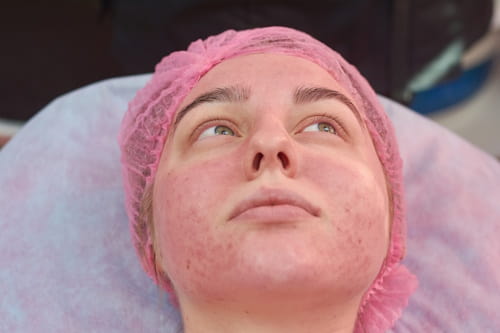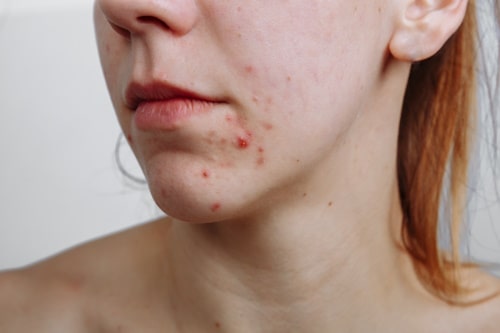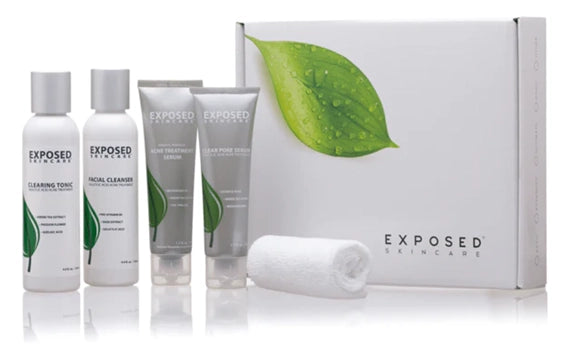When we hear about lupus, we think of a complex autoimmune disease that affects many. We rarely discuss the relationship between lupus and other skin conditions.
However, there is a deep connection between our immune system and skin health. This article dives into lupus and acne, exploring how these conditions intertwine, manifest, and impact those who deal with them.
Also read: How to choose the best acne treatment
Biggest Take-Aways:
- Lupus, particularly systemic lupus erythematosus, can manifest with skin symptoms that often mimic acne, necessitating careful diagnosis.
- Managing lupus-related skin conditions includes lifestyle changes, particularly sun protection, and medications like hydroxychloroquine.
- Differentiating between lupus skin manifestations and other conditions like acne is crucial for appropriate treatment.
- Due to its gentle and effective formulation, Exposed Skin Care offers a beneficial approach to managing acne, especially for skin affected by lupus.

Understanding Lupus: More Than Just a Skin Condition
Lupus, particularly Systemic Lupus Erythematosus (SLE), is a chronic autoimmune condition that affects multiple organs, including the skin. Lupus's relationship with the skin goes beyond the typical rash. Let's break down the various forms of lupus that directly affect the skin.
The Spectrum of Cutaneous Lupus
- Acute Cutaneous Lupus Erythematosus (ACLE): Often characterized by the classic malar or butterfly rash, ACLE primarily affects sun-exposed areas.
- Subacute Cutaneous Lupus Erythematosus (SCLE): This form presents with scaly or ring-shaped lesions that are not as itchy or painful.
- Chronic Cutaneous Lupus Erythematosus (CCLE): CCLE, including Discoid Lupus Erythematosus (DLE), is known for its disc-shaped, scarring lesions that can lead to hair loss and pigment changes.
Each type of cutaneous lupus offers a unique challenge in diagnosis and management, often requiring a careful evaluation of symptoms and skin biopsy results.
The Acne Connection: When Lupus Mimics Common Skin Concerns
Acne, particularly acne vulgaris, is a common skin condition characterized by comedones, pustules, and inflammatory lesions. But what happens when lupus mimics these acneiform features?
Acne and Lupus: A Complex Relationship
- Inflammatory Acne vs. Lupus Lesions: Differentiating between acne and lupus-related skin lesions can be challenging. Both can present with erythematous, inflammatory features.
- Rosacea and Lupus: Rosacea, another skin condition often confused with acne, can also mimic lupus, particularly the malar rash.
- Medication-Induced Acneiform Eruptions: Certain medications used to treat lupus may cause acne or acne-like eruptions, adding another layer of complexity to the diagnosis.

Understanding the nuances of these conditions is crucial for accurate diagnosis and effective treatment.
Tracing the Signs: Recognizing Lupus and Acne on the Skin
The symptoms of lupus and acne can sometimes overlap, making it difficult to distinguish one from the other. Here's what to look out for:
Common Signs of Lupus Affecting the Skin
- Butterfly Rash: A telltale sign of lupus, appearing across the nose and cheeks.
- Discoid Lesions: Thick, scaly patches that may scar and cause hair loss.
- Photosensitivity: Skin reactions following exposure to sunlight.
- Chilblain Lupus: Painful, red skin lesions that occur in response to cold.
Identifying Acne Vulgaris
- Comedones: Whiteheads and blackheads that signify blocked hair follicles.
- Pustules: Inflamed, pus-filled lesions.
- Nodules and Cysts: Larger, deeper, and often painful lesions.
Differentiating these symptoms is critical in steering the course of treatment and management.
Diagnostic Journey: Piecing Together the Puzzle of Lupus and Acne
Diagnosing lupus or acne, especially when they coexist or mimic each other, requires a multi-faceted approach.
Diagnosis of Acne Vulgaris
- Clinical Examination: Typical acne lesions like comedones, pustules, and nodules.
- Patient History: Understanding the duration and progression of the condition.
Diagnosing Lupus and Its Skin Manifestations
- Laboratory Tests: Blood tests, including antinuclear antibody (ANA) levels, are crucial in diagnosing lupus.
- Skin Biopsy: A biopsy can confirm lupus-specific changes in the skin.
- Criteria for Systemic Lupus Erythematosus: Meeting the American College of Rheumatology criteria helps confirm the diagnosis.
The Impact of Sun Exposure: A Key Factor in Lupus and Acne
Sun exposure plays a significant role in both lupus and acne, though in different ways.
- Exacerbating Lupus Lesions: Sunlight can worsen lupus skin manifestations, making sun protection vital.
- Photosensitivity Reactions: Many lupus patients experience heightened sensitivity to sunlight.
- Acne and Sunlight: Sun exposure is sometimes thought to improve acne, but it can exacerbate certain types.

Understanding the effects of sunlight is crucial in managing both lupus and acne effectively.
Treatment Strategies: Balancing Lupus and Acne Management
Treating a patient with both lupus and acne requires a delicate balance, ensuring that the treatment for one doesn't exacerbate the other.
Managing Lupus-Related Skin Issues
- Topical Treatments: Steroids and immunomodulators for localized lesions.
- Systemic Therapies: Antimalarials like hydroxychloroquine are commonly used in lupus management.
- Lifestyle Modifications: Sun protection and avoidance of known triggers.
Treating Acne in Lupus Patients
- Non-Comedogenic Skin Care: Avoiding products that can clog pores.
- Topical Acne Treatments: Carefully selected to not irritate lupus lesions.
- Consideration of Medications: Some acne medications may not be suitable for lupus patients.
The Role of Autoimmunity and Hormones: A Deeper Look into Lupus and Acne
Understanding the underlying autoimmune and hormonal factors is key to comprehending the link between lupus and acne.
Autoimmune Response to Lupus
- Dysregulated Immune System: Lupus involves an overactive immune response, leading to inflammation and tissue damage.
- Autoantibodies: These antibodies, such as antinuclear antibodies (ANAs), play a significant role in lupus.
Hormonal Influences in Acne
- Androgens: Hormones that can increase sebum production, leading to acne.
- Stress Hormones: Stress can exacerbate both acne and lupus, highlighting the need for holistic management.
Exposed Skin Care: A Boon for Acne Management
In the realm of skin disease, particularly acne, Exposed Skin Care has emerged as a beneficial and effective solution. This product line targets acne with a unique approach that blends science and nature.
Exposed Skin Care offers several key advantages:
- Comprehensive Treatment: Exposed Skin Care addresses multiple factors contributing to acne, from blocked follicles to inflammation.
- Prevents Follicular Blockage: The products are designed to penetrate deeply, ensuring follicles remain clear and less prone to acne development.
- Reduction in Inflammation: Essential for managing acne, an inflammatory skin condition.
- Minimization of Acne Scars: Regular use helps in reducing the appearance of scars, a common aftermath of severe acne.
- Prevention of Alopecia in Acne Keloidalis Nuchae: A case report has suggested that effective acne management can also prevent hair loss conditions like alopecia, particularly in inflammatory variants like acne keloidalis nuchae.
Overall, Exposed Skin Care offers a multi-dimensional approach to acne treatment, addressing the root causes and preventing future breakouts, all while being mindful of overall skin health.
Conclusion
The intricate dance between lupus and acne reveals a complex narrative of how autoimmune conditions like systemic lupus erythematosus in patients can manifest uniquely on the skin.
The journey of managing lupus involves understanding the myriad ways lupus presents, often leading to permanent hair loss or scarring. Cases have been reported where lupus causes cutaneous manifestations often confused with acne.
This underlines the need for precise clinical and laboratory evaluations, including immunofluorescence studies and checking antinuclear antibody levels.
Patients with cutaneous lupus, especially those with unusual presentations, face the challenge of navigating a condition that can be exacerbated by exposure to the sun and require treatments like hydroxychloroquine.
These treatments aim to fulfill the criteria of managing both the systemic and dermatological aspects of lupus. In this complex scenario, using products like Exposed Skin Care for acne management becomes a thoughtful consideration.
Its effectiveness in treating acne and other manifestations on the skin surface underscores its importance in the skincare regimen of those affected.
FAQs
Can Lupus Cause Acne?
Lupus does not directly cause acne, but it can lead to skin lesions that may resemble acne. Medications used to treat lupus may also trigger acneiform eruptions.
What are the Common Skin Symptoms of Lupus?
Common symptoms include a butterfly-shaped rash on the face, discoid lesions, photosensitivity, and sometimes, skin sores or lesions that can mimic acne.
How is Cutaneous Lupus Diagnosed?
Diagnosis typically involves a combination of clinical examination, skin biopsies, and laboratory tests, including antinuclear antibody (ANA) testing.
Is Sun Exposure a Risk Factor for Lupus Skin Manifestations?
Yes, sun exposure can exacerbate skin manifestations in lupus patients, making sun protection an essential part of management.
Can People with Lupus use Exposed Skin Care?
Exposed Skin Care, known for its gentle yet effective acne treatment, can be used by people with lupus. However, it's important to monitor skin reactions and consult with a healthcare professional, as individual responses may vary.
















